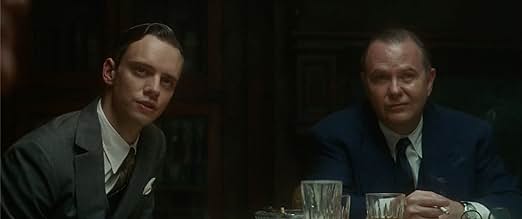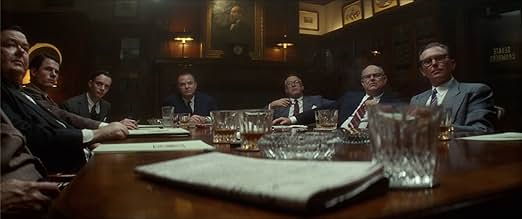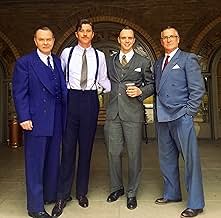Estados Unidos vs. Billie Holiday
Título original: The United States vs. Billie Holiday
AVALIAÇÃO DA IMDb
6,3/10
15 mil
SUA AVALIAÇÃO
Acompanha a Holiday ao longo de sua carreira quando é alvo do Departamento Federal de Narcóticos com uma operação secreta liderada pelo agente federal Jimmy Fletcher, com quem ela teve um ca... Ler tudoAcompanha a Holiday ao longo de sua carreira quando é alvo do Departamento Federal de Narcóticos com uma operação secreta liderada pelo agente federal Jimmy Fletcher, com quem ela teve um caso tumultuado.Acompanha a Holiday ao longo de sua carreira quando é alvo do Departamento Federal de Narcóticos com uma operação secreta liderada pelo agente federal Jimmy Fletcher, com quem ela teve um caso tumultuado.
- Direção
- Roteiristas
- Artistas
- Indicado a 1 Oscar
- 12 vitórias e 25 indicações no total
Warren 'Slim' Williams
- Bobby Tucker
- (as Slim Williams)
- Direção
- Roteiristas
- Elenco e equipe completos
- Produção, bilheteria e muito mais no IMDbPro
Avaliações em destaque
Lady Day deserves much better than this muddled, often tedious and substantially apocryphal "biopic" from Lee Daniels. In this telling of Billie Holiday's life the song Strange Fruit becomes central to the narrative, with government forces determined to stop her singing the mournful lament, afraid that it will ignite a civil rights movement. At one point she's even dragged from the stage after singing just the first few lines. The problem with all of this is it never happened. Federal Narcotics chief Harry Anslinger apparently claimed in letters that he "asked" holiday not to sing the song, but - even if that's true - that's about as far as it went. Holiday was never dragged off stage for singing the song; in fact, she sang the song in the very concert in which the film depicts this as happening. In any case, the civil rights movement was already a growing force long before Strange Fruit became a popular protest song. As for Billie, she was never especially political and was initially ambivalent about performing Strange Fruit. She was convinced more by the way it would be dramatically staged as a final number than by any notions about the political clout of the lyrics. So to make the song central to her life and have Billie so passionate about performing it any cost is in itself dishonest. But then so much of Daniels' film, from the weird Quentin Crisp-like Reginald Lord Divine character who interviews Billie (he never existed) to the romantic affair with FBI agent Jimmy Fletcher, for which there is zero evidence. At best the film offers brief glimpses into the reality of Billie's life, but they're so swamped with apocrypha that you'll have trouble identifying them. Which makes this a pretty messed up biopic, and an extremely half-assed tribute to the great singer. The only saving grace in all of this is Andra Day, who manages to look and sound like Billie for the most part. But even here there are caveats. Day's performances of Holiday's songs are more impressive as vocal impressions than they are for evoking the emotion and pathos that made Billie legendary. And, sad to say, her rendition of Strange Fruit is oddly stilted, almost bland. Not to mention severely truncated. Never mind that this is the song the entire film revolves around. Strange, indeed.
The title is a tip-off that this isn't going to be a general bio-pic. It's a prosecution of a case. Director Lee Daniels has never been accused of being a subtle filmmaker, but here he and writer Suzan-Lori Parks are weilding a mighty gavel. It's a miracle than novice singer turned actress Andra Day still shines.
The basic facts here are indisputable: Billie Holiday was hounded by the government, had a series of bad marriages and died at a tragically young age (44). Still, Daniels' approach of dwelling solely on the abuses of Holiday's life, whether they be legal, physical, sexual or narcotics- related, does a disservice not only to the singer, but to the 'case' he is trying to make. Daniels uses a catalog of tricks which sometimes work - using 16mm and 35mm film for flashbacks (although using digital 'scratches' on the celluloid is a hoary cliche); And some that don't - a long heroin fueled fever dream.
What's missing here is Holiday's artistry. Her inner soul. She had affairs with famous, successful people of both sexes -- but there's no evidence here of why they would be attracted to her. Surely, she had a wit and a charm that goes beyond being an attractive famous chanteuse. Parks' script focuses on the blunt-spoken, yet needy part of her personality, not her passions.
Day does a remarkable job in a blunt, honest way that isn't all actor-ticks. And, unsurprisingly, the singer shines on stage during the performance scenes. It's a breakthrough for her, even if the film around her is in shambles. One is much better off with one of the numerous Documentaries on Holiday.
The basic facts here are indisputable: Billie Holiday was hounded by the government, had a series of bad marriages and died at a tragically young age (44). Still, Daniels' approach of dwelling solely on the abuses of Holiday's life, whether they be legal, physical, sexual or narcotics- related, does a disservice not only to the singer, but to the 'case' he is trying to make. Daniels uses a catalog of tricks which sometimes work - using 16mm and 35mm film for flashbacks (although using digital 'scratches' on the celluloid is a hoary cliche); And some that don't - a long heroin fueled fever dream.
What's missing here is Holiday's artistry. Her inner soul. She had affairs with famous, successful people of both sexes -- but there's no evidence here of why they would be attracted to her. Surely, she had a wit and a charm that goes beyond being an attractive famous chanteuse. Parks' script focuses on the blunt-spoken, yet needy part of her personality, not her passions.
Day does a remarkable job in a blunt, honest way that isn't all actor-ticks. And, unsurprisingly, the singer shines on stage during the performance scenes. It's a breakthrough for her, even if the film around her is in shambles. One is much better off with one of the numerous Documentaries on Holiday.
This movie would make a great triple feature with Ma Rainey's Black Bottom and Judas and the Black Messiah for showcasing racism and injustice systemic and culturally nakedly and honestly. The US vs. Billie Holiday really makes you frustrated in all the right ways and at all the right people but also inspires people like me who didn't know much about this history to learn more and educate oneself since those who don't learn from history...anyway...Andra Day gives an incredible performance and Trevante Rhodes balances the line of someone you want to smack in the face one second and kiss the next. Impeccable gowns and hairstyling add to the glamor and realism of the music being sung so beautifully by her swingin, emotional voice. Day expresses a lot in those eyes tender one minute and giving diva the next. Maybe it's not perfect from a filmmaking point of view but not in any innegligible way and the image of Andra Day screaming with joy and pride in her Golden Globe acceptance speech is enough to make me feel good inside knowing she gave this her all and that her idol would be proud.
I did actually learn some things about Billie Holiday that I didn't know, namely that her song "Strange Fruit" was an anthem for racial injustice and that the FBI used drugs as an excuse to relentlessly pursue her so that they could arrest her and keep her from performing, thereby depriving her the opportunity to incite black audiences. That is the actually very intriguing kernel around which this biopic is structured, but it's diluted by the hot mess of this film's screenplay, that spends far too much time on Holiday's tumultuous relationships with various men in her life.
One of those men is FBI agent Jimmy Fletcher, who's assigned the task of following Holiday around and catching her out. He's black himself, and is subjected to the racial hierarchy within the department, so over time his allegiances switch to Holiday and he becomes her ally. Again, this is actually an interesting parallel story. But again, it's also diluted by everything else going on in this muddled movie.
Why, for example, is the character of Talullah Bankhead and the possible lesbian relationship she had with Holiday even in the film? That story is introduced and literally goes nowhere, as if whole sections of the movie were edited out at the last minute. And why do all the white FBI agents have to be played as caricature villains, as if we won't sympathize enough with the black people unless the white people are as cartoonishly awful as possible. And why does the screenplay feel the need to have characters just tell us what the movie's themes are without allowing us to come to conclusions ourselves? At one point, a black character tells the worst of the FBI agents that the department hates Holiday because she's black and beautiful and threatening (or words to that affect), to which my response was, "well duh."
And there are ridiculous sex scenes and lots of scenes of people using drugs and getting beat up and yelling and fighting. None of this bothered me because of the content, but rather because it all just becomes monotonous and traffics in the most tired of biopic tropes.
Andra Day gives an impressive performance that stands as probably the film's biggest asset. The Academy got it right when they nominated her for an Oscar but chose not to reward anything else about the movie.
Grade: B-
One of those men is FBI agent Jimmy Fletcher, who's assigned the task of following Holiday around and catching her out. He's black himself, and is subjected to the racial hierarchy within the department, so over time his allegiances switch to Holiday and he becomes her ally. Again, this is actually an interesting parallel story. But again, it's also diluted by everything else going on in this muddled movie.
Why, for example, is the character of Talullah Bankhead and the possible lesbian relationship she had with Holiday even in the film? That story is introduced and literally goes nowhere, as if whole sections of the movie were edited out at the last minute. And why do all the white FBI agents have to be played as caricature villains, as if we won't sympathize enough with the black people unless the white people are as cartoonishly awful as possible. And why does the screenplay feel the need to have characters just tell us what the movie's themes are without allowing us to come to conclusions ourselves? At one point, a black character tells the worst of the FBI agents that the department hates Holiday because she's black and beautiful and threatening (or words to that affect), to which my response was, "well duh."
And there are ridiculous sex scenes and lots of scenes of people using drugs and getting beat up and yelling and fighting. None of this bothered me because of the content, but rather because it all just becomes monotonous and traffics in the most tired of biopic tropes.
Andra Day gives an impressive performance that stands as probably the film's biggest asset. The Academy got it right when they nominated her for an Oscar but chose not to reward anything else about the movie.
Grade: B-
But the film is a mess. Poorly written, haphazardly directed and edited. I love Billy Holiday and I should have loved this movie. Grateful for Andra Day's performance. It's up there with Frances McDormand's work in Nomadland as a top Oscar contender.
Você sabia?
- CuriosidadesThe songwriter of "Strange Fruit", Abel Meeropol, and his wife, adopted and raised the sons of Julius Rosenberg and Ethel Rosenberg, who were executed for treason on June 19, 1953.
- Erros de gravaçãoAt 36:33, an elderly couple of Chinese are speaking standard Mandarin in a restaurant presumably in Harlem. However, Mandarin speakers would have been extremely rare in New York or anywhere else beyond Northern China at that time and for several decades afterwards. Any Chinese in New York and the rest of the States and Europe would have been speaking Cantonese, Hokkien, or some other Southern Chinese dialect, with the exception of the wealthier Shanghainese, who had their own dialect until very recently.
- Citações
Billie Holiday: You know, the people that are hardest on me are my own race. I need help; not jail time.
- ConexõesFeatured in The Tonight Show Starring Jimmy Fallon: Tom Holland/Andra Day (2021)
- Trilhas sonorasPrologue I & II
Written, Produced and Performed by Salaam Remi
Principais escolhas
Faça login para avaliar e ver a lista de recomendações personalizadas
- How long is The United States vs. Billie Holiday?Fornecido pela Alexa
Detalhes
- Data de lançamento
- País de origem
- Centrais de atendimento oficiais
- Idiomas
- Também conhecido como
- The United States vs. Billie Holiday
- Locações de filme
- Montreal, Québec, Canadá(location)
- Empresas de produção
- Consulte mais créditos da empresa na IMDbPro
Bilheteria
- Faturamento bruto mundial
- US$ 1.312.432
- Tempo de duração2 horas 6 minutos
- Cor
- Mixagem de som
- Proporção
- 2.39 : 1
Contribua para esta página
Sugerir uma alteração ou adicionar conteúdo ausente

Principal brecha
By what name was Estados Unidos vs. Billie Holiday (2021) officially released in India in English?
Responda






































